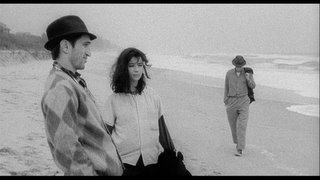
Discovering Jim Jarmusch is always much fun. This might be due to the stock of black humors, the obscure angle to the society and most profoundly his sense of minimalist to the core that he possesses inside every reel. Well
Stranger than Paradise is much above all these points, perhaps that’s why delving into the movie was more enjoying.
Eva flies from Hungary to meet her cousin and to stay few days before she is shifting her base to Cleveland. Her cousin Willie is a self styled New York hipster by attitude and throws quite an undesirable welcome to Eva. But then, from an epoch of hostility and initial indifference a strange affection grows between the cousins. They both exchange gifts before saying a good bye to Eva (though she did not like the NYC-trendy dress). After a year Willie and his mate Eddie (one more hipster with an interest into Eva) following a hefty win in a card game decide to come over their boredom and to travel Cleveland to visit Willie’s old aunt Lottie and of course Eva (who is then working in a food chain). While coming back from the wasteland and snow clad Cleveland both guys decide to travel the paradise on earth that is sunny Florida. They take Eva with them and move on the journey to follow stranger incidents.
The perspective of the film is reflected from the three protagonists of the movie. Eva in one hand is expecting a sense of adventure and variation in every day life; from the starting gun we see her walking in the streets of NYC with playing a tape of Screamin' Jay Hawkins' "I've Got a Spell On You”! We see her relentless trying in coming out of the monotony of life (whether suggesting many a times “"It's Screamin' Jay Hawkins and he's a wild man, so bug off" or doing at least some activity within the dark and odd lifestyle of Willie by doing vacuum cleaning!). Willie in the other hand lives an epitome of utter loneliness. He does want the change, but not conscious about how to win it! We see repeated shots of smoking many Chesterfields, watching television, eating American diner (perhaps best explained in his comment “You got your meat, you got your potatoes, you got your vegetables, you got your dessert and you don't have to wash the dishes - this is how we eat in America!”) playing solitaire, visiting Aunt Lottie and doing repeatedly everything same. Jarmusch implicitly asked the audience, is he representing the life style of the whole generation? The third guy, Eddie is again a personification of detail world-weariness of an average American. He has never been to anywhere (say Cleveland or Florida) but makes reasonable comments; is he also looking for changes as we all?
Jarmusch shot the film in black and white, with a certain time gap between all scenes. The dullness of the nature or driving long tedious snowy road is all symbols to express the same as the standpoint of the characters. The best shot from my perception is when all three try to visit the Lake Erie in Cleveland. They have to visit the same, as this is only one famous thing in Cleveland was known to them (to bring changes?) but being winter, there is nothing to see but a great expanse of snow and ice extending to the fatal gray horizon. This is such a tragic shot which expresses how human being are bound to find changes but nothing works in the backdrop of our gray life; though shot in an alter image of comic, this explains Jarmusch’s great command in making. Also one more shot to remember, when Willie buys three sunglasses the time they reach Florida; Jarmusch is brilliant in depicting that how such an insignificant bustle is important in the story line to illustrate changes in life.
See the ending of the movie for the stranger events; this is a minimal solid effort from Jarmusch. This is highly cited as one of the most deadpan comedies ever made! Stranger than Paradise is a highly recommended black and white gem.
Stranger than Paradise ( 1984)
Directed by : Jim Jarmusch
 Discovering Jim Jarmusch is always much fun. This might be due to the stock of black humors, the obscure angle to the society and most profoundly his sense of minimalist to the core that he possesses inside every reel. Well Stranger than Paradise is much above all these points, perhaps that’s why delving into the movie was more enjoying.
Discovering Jim Jarmusch is always much fun. This might be due to the stock of black humors, the obscure angle to the society and most profoundly his sense of minimalist to the core that he possesses inside every reel. Well Stranger than Paradise is much above all these points, perhaps that’s why delving into the movie was more enjoying. 